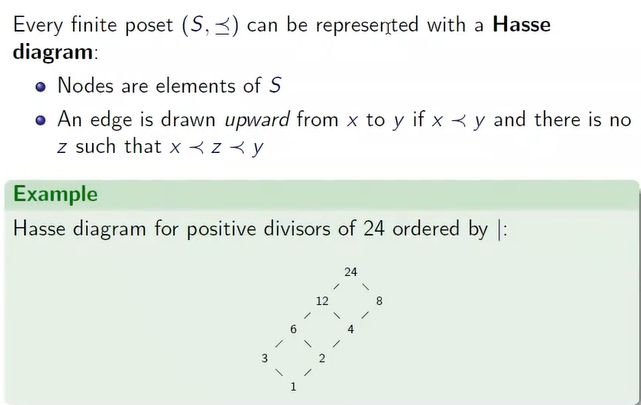1.
2. give examples of relations with specified properties, S, not R, not T
example: inequality
3. equivalence relations
Reflexive; Symmetric; Transitive
4. Suppose R ⊆ S ×S is an equivalence relation, the equivalence class [s] (w.r.t. R) of an element s ∈ S is
[s] = {t : t ∈ S and sRt}
! ! ! s R t if and only if [s] = [t]
prove: [s]=[t]
[s] ⊆ [t]
x∈[s]
so s R x
so x R s (by S)
so x R t (by T)
so t R x (by S)
so x∈[t]
we can do the same with x∈[t]
5. partitions
举例:show that m~n iff m^2=n^2(mod 5) is an equivalence on S={1,2...7}, find all the equivalence classes
[1]={1,4,6}=[4]=[6]
[2]={2,3,7}=[3]=[7]
[5]={5}
6. partial order
7. Using Hasse diagram to represent finite poset:
8. ordering concepts
a) Minimal and maximal elements (they always exist in every finite poset)
b) Minimum and maximum — unique minimal and maximal element (might not exist)
e.x. 若1向上指向2,3,2与3上面均没有更大的数,故两者均为maximal,但不是maximum,1既为minimal也是minimum
d)Lattice — poset where lub(x,y) and glb(x,y) exist for every pair of elements x,y
同样上面的例子,因为2,3没有lub, 所以is not a lattice
9. Total orders
A total order is a partial order that also satisfies:
(L) Linearity (any two elements are comparable):
For all x,y either: x ≤ y or y ≤ x (or both if x = y)
在有限集合上,所有的总阶都是“同构的”
在一个有限的集合里有很多种可能性
10.
11.
12. combining orders
13. 类比字典排序
e.x. Let B = {0,1} with the usual order 0 < 1. List the elements 101,010,11,000,10,0010,1000 of B∗ in the
(a) Lexicographic order 000,0010,010,10,1000,101,11
(b) Lenlex order(by length first) 10,11,000,010,101,0010,1000
14. If a set Σ is totally ordered, then the corresponding lexicographic partial order on Σ∗ also must be totally ordered
answer: True
If a set Σ is totally ordered, then the corresponding lenlex order on Σ∗ also must be totally ordered.
answer: True
Every finite partially ordered set has a Hasse diagram
answer: True
Every finite partially ordered set has a topological sorting
answer: True
Every finite partially ordered set has a minimum element
answer: False
Every finite totally ordered set has a maximum element
answer: True
An infinite partially ordered set cannot have a maximum element
answer: False








